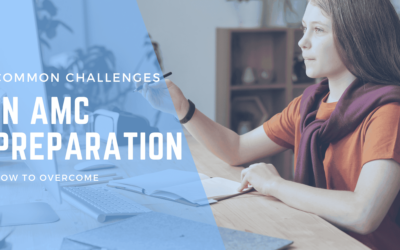They say that the best time to plant a tree was 20 years ago, but today would be the second best. That’s how I feel about writing about the American Math Competition (AMC): I wish I had spent more time writing about it in the past, but I’ll do the next best thing and write right now.
First off:
What is the AMC 10/12?
The AMC 10 and 12 are both 25-question, 75-minute, multiple-choice tests crafted to not just test but also nurture your problem-solving prowess.
The AMC 10, tailored for our younger math enthusiasts in 10th grade or below, encapsulates the high school curriculum up to that grade. So, if you’re under 17.5 years old and in grade 10 or below, this is your arena.
On the other hand, the AMC 12 is a bit more advanced, covering the full spectrum of high school math, from trigonometry to advanced geometry. But don’t expect any calculus here! It’s designed for those in grade 12 or below and under 19.5 years.
Who (Should) Care About the AMC?
You should — If you have (or are, or know) a student in high school who is interested in STEM and good at school.
That student (plus their support structure) is usually focused on these three goals:
- Get good at core skills needed through adult life
- Build out a resume that opens doors later
- Get through this craziness without excessive friction or stress
For these students, the AMC remains a little-known but very powerful tool for helping to accomplish these goals.
Should I Wait Before Taking the AMC?
Not if you want to participate this school year. The AMC 10 and AMC 12 exams, usually given in February, are being given in November this year. This means much less time to prepare, but crucially, it also means that participating seniors will get to use their good scores in the college admissions process.
Another benefit: Those who participate this year will have much more time to prepare for the second level of the competition (the American Invitational Math Exam, or AIME) in March, if they qualify in November. In past years, students would discover they qualified for AIME with a week or less to spare before competing. This year, competitors will have months to prepare.
This matters for a couple of reasons, but the one most people focus on is that top schools want to know when an applicant made the cut for AIME. It’s one of those distinguishers that can really matter, especially for schools with STEM-focused reputations and/or “elite standing.”
Recent Testing Trends
- Over the last 20 years, high school has generally become a more systematized “accomplishment treadmill,” with the advantages and disadvantages that this implies
- Over the last several years, the ACT and SAT have taken significant credibility hits. These include equity issues, doubts about correlation to college success, rejection by major universities, and most recently logistical difficulties simply being able to sign up for and take the test
- Side note: One problem with these tests that has always been lurking under the surface is that whatever it is that they test, they test it best for the people in the middle of its bell curve, but their results are most scrutinized for the people at the top of its bell curve. I.e. a harder test would be better suited for the people who need it most
- Nonetheless, competition for college admissions has remained very high
College admissions offices, understanding all these trends, are continuing to use the AMC as a distinguishing characteristic among otherwise hard-to-distinguish strong students.
I expect that the AMC will continue to increase in prominence in the coming years.
What I Have Observed
Students who prepare for the ACT or SAT tend to prepare by filling knowledge gaps, which is all to the good. For most students, this remains the focus throughout their preparation.
Students at the high end of the curve who prepare seriously, though, only start their preparation the same way. Before too long, they run out of facts to learn and techniques to leverage, because the test simply doesn’t cover that much material that they haven’t already learned. (This is a big part of what I meant when I said that the test is geared towards students in the middle of its curve, but the students who care about it most are the ones at the top of its curve.)
This is the point at which things start going sideways:
- Preparation becomes an exercise in meticulousness, sometimes to the exclusion of engaged critical thinking. For these students, these tests are about simply not letting their attention drift as they answer easy question after easy question. (In my view, this selects for the wrong skills and habits among “top” students and sets them up for trouble later. If you see it differently, I recommend the movie Brazil. It’s really good, and I hope you like it as much as I do, even though it makes me cringe to watch it.)
- Also, preparation often becomes an exercise in anxiety management. I feel better about this consequence since anxiety management is a real-life skill for sure. But I think we can all agree that that’s not the thing we all want to be selecting for in this context either.
I’ve also observed that students preparing for tests that really challenge them develop skills that in my view hold much higher value overall: critical thinking, self-awareness and self-management, self-evaluation and metacognition, and creative problem-solving.
What I Sometimes Advise About the AMC
If the ACT or SAT isn’t hard enough to allow you to show off your real skills, and you like STEM, then the AMC is probably worth looking at:
- You get to work on problems that are harder than anything your teacher would subject your whole class to
- You get to explore interconnections in the math you already know without having to learn a ton of new material
- You get to practice the critical skill of making progress even on incomplete information
- Top universities actively solicit your AMC 12 score. This tells you everything you need to know about its importance to them
Recent Trends in the AMC Exams
At the top levels, the AMC can be seen as a feeder program for the International Math Olympiad. The US, Russia, and China have been vying for top honors at the IMO for the last few years now. I genuinely don’t know how much of this should be attributed to good coaching; I’m impressed by head coach Po-Shen Loh — he’s clearly focused on teaching well instead of merely on being smart, and you’d be shocked at how many miss that — but that’s all I know because I’m not anywhere near the inner circle at that level.
But what I do know is that Richard Rusczyk’s project Art of Problem Solving has become the dominant force in this area. What started as a pair of (excellent) books and a thriving community has become the 900-pound gorilla in the space; practically every serious student competitor has some relationship with AoPS. There’s a ton of good stuff to say about AoPS, but I’ll also mention that two false impressions often come out of students’ initial foray there:
- “There’s a ton of math I need to learn in order to be successful here.”
- “Reading through other people’s solutions is the best way to learn.”
Regarding #1, it would be more correct to say that AoPS will help you learn a ton of math, and a relatively small slice of it is needed for AMC success. Figuring out what’s important remains more art than science, data analysis notwithstanding, because — at least at the AMC level — doing a good job of using what you know is generally more valuable than knowing more.
And regarding #2, AoPS rightly discourages this perspective, and actively, but you can only do so much when such a large proportion of your site is dedicated to the thing you’re telling everyone to use only judiciously. I mean, it’s been said plenty before: math is not a spectator sport.
Doing math — and analyzing your steps and missteps after the fact — is the way to get good at it. Deliberate practice isn’t easy, often isn’t fun, and it certainly isn’t your default behavior when you’re reading a website. But it’s the best way. Unfortunately, almost no students get this, at least not at the early levels.
Relate Resources for AMC Test Prep
A few related videos
- My colleague Dr. Deborah Bedor and I recently discussed the AMC’s importance to strong students in this interview. (Bonus: It’s the last recorded video featuring my excessive pandemic beard and haircut. So enjoy, but please be gentle with your comments. I know it looks a bit silly.)
- Some years ago, I argued that the AMC benefits girls even more than boys. I don’t see any evidence that that has changed since then. (After the first short video, this gives way to a playlist of short informational videos about the AMC.)
I’m happy to help directly
- There’s no charge for a scheduled video chat with me. (If you have a personal connection with me, please mention it, but it’s unnecessary.)
- My online AMC prep course is open for business. If you need to learn the fundamentals of AMC math, this is the place for you.
- I know a lot of specialists who can help in various ways, and I see connecting people as an important (and enjoyable!) duty. If you need specific help, let me know what you’re looking for and I’ll do my best. And if you’re a fellow professional, please get in touch to let me know what you do best, so that I can help connect you with families who need it.
Other quick links
- My buddy Amie Dorsey and I just recorded the 13th episode of our (now-monthly) podcast WATEC: The Excellent Conversation. You can just search for it on your podcast app, or watch it on YouTube. They’re about an hour each, and you’ll find links to snippets of the conversation in the comments so that you can browse for what’s most interesting to you.
- Wes Carroll’s Puzzler introduces parents and students alike to AMC problems and related brain-teasers. (No scratch paper required!) It’s fun for families to challenge each other around the kitchen table, and it’s also good for listening on your walk or run.
As I’m sure you know, subscribing to either or both of them lets us notify you when new episodes are ready, and also helps others to find them.
Last words
Hey, thanks for showing up here. I hope you found it helpful, or at least interesting. Subscribe to my newsletter at wescarroll.substack.com.
I’m [email protected], I read all feedback personally, and I really do care whether this was helpful, and how I can make it better next time around.
Here’s to another great school year for us all!



0 Comments